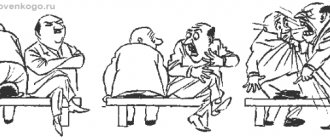There are two dangerous misconceptions in copywriting. First: “A copywriter is the author of texts for websites and works for thousands of characters.” If you have been reading this blog for a long time, then you perfectly understand the absurdity of this statement. If you are just starting to read the blog, then this is the place for you.
The second dangerous misconception: “Copywriting is writing advertising texts to sell goods, services or ideas.” You may now re-read it and ask: “What’s wrong with that?!” Everything seems to be written correctly. Even Wikipedia says something like this. So it is, but only in theory. In practice, this statement misleads many beginners and leads to a lot of “selling” texts in the style: “Buy our product/service or idea because they are so cool!” And such texts sell a little worse than nothing. For one simple reason: if you follow this belief literally, then the interests and needs of the people who read your text are not taken into account. But meanwhile, copywriting is primarily about working with people and their values, and not with goods and services. The latter are just a tool to satisfy certain needs.
Professional copywriters understand this, but beginners often have difficulties with understanding and perception, and they begin to sell products and services, as they say, head-on. But this is obviously a losing strategy. Therefore, speaking from the mind, it is better to take the phrase literally like this:
Copywriting is a solution to the problem of meeting people's needs with the help of goods and services, through text.
Okay, let’s say, you say. But then the task becomes much more complicated. Of course, it’s good when there is analysis data on needs, or when you can talk to the target audience. But what to do when this data is not available? How to find out the needs of people in a completely unfamiliar niche?
And here neurophysiology comes to our aid. In today's article I want to tell you about three types of people. When you know them, you can easily adapt to the needs of your audience in any niche: from selling cars to apples to wholesale warehouses. Make yourself comfortable, we're starting!
By the way, if it is more convenient for you to perceive information in video format, then this same topic is in a separate express lesson.
Where can I get more information on the topic?
Oh yes, important point. If this topic interests you, and you want to learn more about the three types of people described, with links to research, etc., then you can find all the necessary information in Andrei Kurpatov’s book “Trinity”.
If you don’t have time to finish a whole book yet, and you want to learn more specifically in the context of copywriting, then you can look at the 4th chapter of the book by your humble servant “Copywriting from Scratch”. It also talks about these types, as well as other aspects of audience research, building associative bridges and other very cool things. This is what these books look like.
Needs and instincts that lie behind them
If you remember the school biology course, then probably when you hear the word “needs” you immediately have an image of the pyramid proposed by Abraham Maslow. She looks something like this.
Relatively speaking, there are several levels, and when one is satisfied, a person moves to the next, although there are exceptions when a person jumps over certain levels. We will not consider this pyramid in detail now, because it is only indirectly related to the matter.
The point is that all these needs described in the pyramid can be reduced to three basic instincts (the legendary neurophysiologist Ivan Petrovich Pavlov, at least the first two, began to describe them in his time):
- The instinct of self-preservation
- Instinct to preserve the species (sexual instinct)
- Instinct to preserve the group (social instinct)
In the brain of every person, all three instincts live and pull the levers and, in fact, it is they who control our lives. But all people are different, and different people’s instincts are expressed differently, to one degree or another. For example, in an individual person, instincts can be expressed as follows.
An example of the severity of instincts in an individual person (the diagram will be different for different people).
The intensity of instincts can be any, but there is always some instinct that dominates. In the picture above, this is the instinct of self-preservation. Another person, for example, may have a more pronounced sexual or social instinct. Moreover, depending on situations in life, different instincts can take over the reins, so to speak. And yet, most of the time, one instinct always dominates in the brain, which determines the type of thinking of a person; it is also called “radical”. This is where our classification begins.
- People in whom the instinct of self-preservation dominates are called schizoid .
- People whose sexual instinct dominates are called hysteroids .
- People whose social instinct dominates are called neurotics .
It is important to note that the names above are not name-calling, but merely elements of classification. I say this by the way, because many people like to distort them. Let's now look at each type separately.
Please note that for better understanding we will consider types in their pure form. In practice, such “pure” radicals are rare, since, as we have already said, each person has a unique mixture of three instincts at once (but when they do occur, they are very, very colorful personalities). Therefore, do not be surprised if in the descriptions of various radicals you can recognize your own traits or the traits of someone you know.
Schizoid type
The main definition of the “schizoid” personality type is detachment. Such people live in their own world, and those around them often consider them strange, “out of this world,” or even inadequate. Often schizoids become objects of ridicule, humiliation or ignorance.
Such people are constantly looking for some new activity for themselves - even if it is not always useful or socially approved. The main thing is full involvement in the process.
Due to lack of acceptance by society, schizoids often withdraw into themselves, cut off all connections and plunge headlong into the world of the Internet. They love creativity, philosophy and knowledge of the inner world of man. They are delighted and happy when they finally meet someone who understands them: in this case, they can tell a lot about themselves and share even the most terrible secrets. To earn the trust of a schizoid, it is enough to penetrate his inner world and be on the same wavelength with him.
Schizoid symptoms can also include:
- irresponsibility;
- sensitivity, vulnerability;
- confused, chaotic speech;
- clumsiness;
- ability to be involved in several activities at the same time;
- lack of sense of humor.
People with a schizoid personality type usually make good programmers or inventors (if they have the ability). Another suitable definition for a schizoid is extraordinary.
An example in this case would be a person who spends time on the computer almost 24 hours a day and shows no desire to interact with people in the real world.
Do not miss
- Do not miss
Test: Are you addicted to your phone?
The appearance of such an individual, as a rule, is not particularly well-groomed: wrinkled, stretched clothes (often reminiscent of a robe), disheveled hairstyle. Favorite items include headphones, backpacks or tote bags. When leaving the house, he takes with him a backpack filled to the brim with all sorts of things, and puts on several layers of clothing. The main style is informal. It is important to note that, of course, not all schizoids look exactly like this - there are also those whose appearance is the opposite of what is described.
It is believed that a schizoid psychotype at an early age can be recognized by the following characteristics:
- the child's consumption of food strictly from certain dishes;
- reluctance to accept something from a stranger;
- the desire to ensure that everything is always in its place.
The characteristics of schizoid personalities also include difficult adaptation to new conditions, violation of social norms and rules, the inability to express warm feelings for a particular person, and the desire for maximum security.
Schizoids (constructors)
As I already said, people with a dominant instinct of self-preservation are called schizoids. And also designers, because they like to organize and structure everything into a coherent, clear and understandable system. This also applies to people: here is family, there are colleagues, there are friends of the wife, and here are distant relatives. Everything is in groups, everything is clear. Let's look at other features of schizoids.
Obsession with safety. Everything is logical here: since schizoids are driven by the instinct of self-preservation, safety always comes first for them. In all aspects. Moreover, their basic instinct is always on high alert and intensely looking for danger everywhere, even where there is none. Therefore, acquaintances often call schizoids paranoid: double-checking whether the door is closed, turning off the water, even when leaving for a couple of hours - this is a common thing for them. Otherwise, thieves will suddenly break in or water will leak - this is a “hit” on the money. By the way, schizoids really don’t like to spend money and are even more afraid of losing it, because... They associate them with safety.
Fear of uncertainty. Schizoids really don’t like uncertainty and are afraid of it, because uncertainty cannot be calculated, and the instinct of self-preservation will find in it an infinite number of risks, dangers and terrible fears, and they are oppressive. That is why a schizoid always strives to clarify and asks a lot of questions. He cares little about whether a question is tactful or not, correct or incorrect - a schizoid needs answers so that everything is clear and understandable, and he cares little about ethical standards.
The desire for control. This is a consequence of the previous point. The schizoid is confident: the system is stable and predictable when it can be controlled and has a minimum of uncontrollable elements. Therefore, he strives to control everything. Myself. In all aspects of life: from work to everyday life. Schizoids do not like to delegate work and often live by the principle: “If you want to do it well, do it yourself.”
Mistrust. Schizoids do not particularly trust people because they cannot be 100% sure of them. And where there is uncertainty, there is uncertainty. And schizoids, as we already know, do not like uncertainty. Fear and the instinct of self-preservation forces the schizoid in every person to see potential danger, betrayal, and unpredictability. And this greatly hinders them in terms of close relationships. Schizoids are often antisocial, but at the same time they have good contact with people at a “safe distance”, when there is no threat and communication can be stopped at any time.
Systematicity. Schizoids reduce everything into a system of knowledge where there are strict logical and cause-and-effect relationships. If incompleteness, contradiction or logical inconsistency (cognitive dissonance) suddenly arises, the schizoid begins to experience severe discomfort and does not calm down until he puts the system in order and closes the task.
Rationality. Schizoids always carefully weigh all the pros and cons and calculate every step. Impulse purchases are never about them. They are constantly looking for the optimal solution, and are very upset when they make an irreparable mistake, trying in every possible way to justify the correctness of the choice made.
Caution and prudence. Schizoids really do not like risks and constantly double-check everything. So, they read from cover any contracts and documents that they need to sign. Even if they are told: “This is a standard contract,” the schizoid, without blinking an eye, answers: “You never know what you wrote there in small print, I have to check.” And he doesn’t care that such phrases can hurt or offend a person. Safety comes first here. For the same reason, schizoids do not like to take loans: loan agreements often contain many fines, penalties and pitfalls, and this frightens them very much. Schizoids are less likely than other types to become victims of scammers, because by default they believe that everyone wants to deceive them and scrupulously double-check everything.
Tendency to hypochondria. As we have already said, the instinct of self-preservation in schizoids works in high alert mode and looks for danger everywhere. And if he fails to find any external threats, he does not get upset and easily finds threats within the schizoid himself, listening to his body. If something hurts or stings, the instinct of self-preservation immediately sounds the alarm and drives you to Google information about what it could be. And since on the Internet there are now a lot of articles on medical topics from web writers who, understanding the topic a little worse than nothing, write terrible diagnoses with or without reason, the schizoid begins to panic, and then it’s not far from neurosis.
Reaction to logic and facts. A schizoid is easy to frighten, but it is also easy to calm and convince if you consistently build a logical chain of facts. Numbers, objective evidence, reliable research - all this works great with this type of person.
Expectations. Schizoids never expect the desired behavior from people and always strive to resolve issues on their own. If they need something, they will just come up and ask. No foreplay, no fawning, no beating around the bush. Directly and to the forehead. Social games are not about them.
A typical example of a schizoid is scientists obsessed with their work. Many consider them not of this world, but in reality their behavior almost always fits completely into this classification.
A little cheat sheet with the main points to summarize everything.
Schizoid in relationships with other psychotypes
Author - A.P. Egides. The book “How to understand people, or Psychological drawing of personality”
Among all psychotypes, fifteen percent are schizoid. There are approximately equal numbers of women and men among all schizoids. All this is just my intuitive observation.
It makes sense to study statistical relationships, but only out of idle interest. You can be satisfied with these intuitive observations.
But it makes sense to talk about the combination of schizoid characteristics with traits of other psychotypes in a little more detail.
Often schizoid traits are accompanied by hysterical ones. But not positive, but negative. And then schizoid dysplasticity is complemented by obsessive demonstrativeness. It looks funny and ridiculous. And if the schizoid intellect is combined with melodious hysterical intonations, as happens with literature teachers, then the impression of other negative schizoid qualities is smoothed out.
This is the path to success. But often, unfortunately, we encounter the first option, and not the second.
A schizoid acquires paranoid traits less often than hysterical ones. It happens that in the process of schizoid intellectual “free floating” and against the background of success, a certain sense of purpose arises. This option would be good if the goals set by the schizoid were always noble.
But irresponsibility for cloning and other types of genetic engineering, for the Manhattan projects and transplantology is aggravated by accumulated paranoia, the tenacity with which “paranoid schizoids” achieve results. Now, if all schizoids had the morality of Copernicus, who did not publish his work on the heliocentric system of the world only because he considered it untimely. He was afraid to bring confusion into minds with his discovery - just into minds, and not into issues of war and peace (and now we are talking not just about war, but about world war).
Now about the relationship of a schizoid with other psychotypes and communication with them.
It is difficult for schizoids to get along with hystericals, they do not have common interests, we almost never see them together. And if they do meet, then the hysterical laughs at the schizoid for his disdain for fashion, and the schizoid with the hysteroid simply has nothing to talk about. The schizoid has eternal conflicts with his hysterical wife over low earnings.
We have already said so many times that a schizoid is a supplier of philosophical and speculative ideas, and a paranoid is their developer and fighter for their implementation, that we apologize for an unnecessary reminder of this.
Communication in the “schizoid-schizoid” system has already been partially illustrated in the episode with Hegel and Feuerbach. And if we translate it into everyday life, then they usually communicate with similar lonely intellectual brothers, discuss their often lifeless projects over beer and vodka, psychic sessions, smoke cigarettes, smoke stairwells while talking, burden each other with their problems and ideas, experiment with gravity-levitation, they demonstrate either “telekinesis” or their erudition... They gather in spontaneous flocks in the smoking rooms of libraries, but they also read a lot there, in contrast to the hystericals who demonstrate their involvement with the intellectual elite. They gather in each other's apartments, drink coffee, and stay up late. The next morning, with heavy heads, they go to read or listen to lectures. And the vagueness of their positions is further aggravated by the fog in their heads from sleepless pastime.
Schizoids have eternal conflicts with epileptoids due to disorder in things. They also arise with psychasthenoids because of the latter’s love for cleanliness and neglect of it on the part of schizoids.
Hysteroids (reflectors)
Hysteroids are often called reflectors, from the English word reflect - to reflect. It is this word that reflects their essence: their sexual instinct dominates, and they see themselves in other people. The better a person treats a hysteroid, the more he admires him, the more significant he is. This type often includes creative individuals: artists, musicians, sculptors, etc., in a word, all people who express themselves in one way or another and want the world to revolve around them and everyone’s attention to be focused on them. This makes evolutionary sense. The main thing for the sexual instinct is to attract a partner in order to pass on genes to subsequent generations. And in this race it is often impossible to take an honorable second place. Let's look at the main features.
Egocentricity and emotionality. Hysteroids, as a rule, are very emotional and first of all think about themselves and are fixated on themselves. Moreover, they can project their desires and complexes onto other people. A typical example is when a person begins to maintain not only his own accounts on social networks, but also accounts on behalf of his child, with all the ensuing consequences. In this case, the hysterical does not think much about the child, he thinks about himself, attracting attention according to the principle “MY child is the best and famous.” The social and ethical component of the hysterical person in this vein does not concern him at all, and if someone starts reproaching him, he will receive a massive emotional and public attack. And the louder it is, the more attention it attracts, the better for the hysteria. It doesn’t matter here whether PR is black or white—the main thing is everyone’s attention.
A penchant for creativity and attention. Creativity is a way of self-expression and attracting attention. In its various manifestations: music, visual arts, dance, etc. This also includes more provocative methods: full body piercings, khaki hair, provocative haircuts, tattoos, etc. Attention is everything for a hysterical person, so they go to any lengths to make the world revolve around them, talk about them, admire them, etc.
The mirror principle. If schizoids see people tied to certain categories, then hysterics see people tied to themselves. Whether a person admires them or hates them, he is significant. If not, then such a person does not exist for the hysteroid. By the way, hysterics often skillfully turn the hatred of other people into the right direction for themselves, creating a tragedy, reveling in feelings and making sure to flaunt them. Hysterics don’t secretly worry about themselves, because, as they say, there is neither self-interest nor joy in this. Most of all, hysterics are afraid of losing their attractiveness, both sexual and media.
Statements of desires. Hysteroids follow their desires and do what they want without thinking about the consequences. Where the schizoid will calculate the risks, the hysterical will go and do it, and then - come what may. Do you want extreme skydiving? Where is the nearest airfield?! Do you want to be the coolest with your new phone, but don’t have the money? No problem, you can take out a loan! And if you already have a lot of loans, you can refinance at another bank. So what if the collectors remember the number by heart - what matters is what you want here and now, and nothing will stop the hysteroid from realizing certain desires. They rarely learn from mistakes and often step on the same rake, but at the same time they are much easier to rise and often achieve success, simply because they do not see obstacles and do not think about the consequences. Risky adventurers.
Fear of losing primacy. Most of all, hysterics are afraid of losing their primacy and number one status. They are ready to lay down that they are the best, the first, the very best.
Dislike of competitors. As a consequence of the previous point. Hysteroids hate competitors and really don’t like it when people speak well of their rivals or, even worse, compare the hysteroid with them, especially in an unfavorable way. At the same time, from a positive comparison, where his superiority is emphasized, the hysteria is already thrilled.
Flattery, exclusives and snobbery. Hysterics are very susceptible to flattery, even sometimes very cloying, and often show outright snobbery: they love to consider themselves among the elite and to look down on others. And not just to rank it, but to boast about it, so that everyone can see the greatness. They also really love what is inaccessible to others: scarce or exclusive, collectible things and to be sure to show it all off.
The golden rule of friendship. Hysteroids are especially susceptible to the golden rule of friendship: in order to please a hysteroid, you need to make him begin to like himself even more.
In a word, hysterics live to be the center of attention, to have the world revolve around them, to be admired (or hated), but in no case remain indifferent. A typical example is a shocking couturier who in every possible way attracts attention with scandalous performances.
Cyclometic
Such a child is like a little sun. From the very first days he illuminates his little world with a smile and laughter. He constantly shares his joy of entering this world. He has a wonderful appetite and a good mood; while eating, such a child will chat, ask questions, and also experiment with food: with the way it is consumed, combining foods, and the appearance of foods.
The main feature of cyclometics is high self-esteem, self-esteem, and a great desire to get to know the world, people, and experiment, which is why the words “I myself!” for such kids are the norm. These are fearless travelers, they are easy to spot on the playground: they will never sit near their parents, they are brave and active! It is easy to be friends with such kids: they express their emotions and are sensitive to others.
Sometimes adults think that this is, in their opinion, an excessive reaction to certain events, but for a child, cyclometics is the norm. Such children do not know how to be offended for a long time, do not withdraw into themselves, and in most cases they are in a good mood. They know how to share, and do it with pleasure, but not to their detriment.
The task of parents : not to limit the child, not to try to shame him or break his will. Set rules and boundaries only through explanations and conversation, and not because “Parents know best” or “Parents are always right.” If parents do not try to come to an agreement with the child, explain why it is necessary to do this and not another, they break the child’s will by force, this often leads to neuroticism, which is expressed in protest when the child does everything the opposite, or when isolation and apathy appear .
A flow of fresh impressions and emotions is very important to a cyclometic child; the monotony of games and the same type of pastime makes him bored, and then the baby begins to act out home performances based on the manipulation of the emotions of others. The difficulty for such kids is that it is difficult for them to concentrate and finish things, in addition, the category of time and money for cyclometics is also blurred. They may be late, not have time to do something, and easily spend money. Therefore, the task of parents is to gently help structure time and order.
Neurotics (centrists)
Neurotics are people in whom the social instinct dominates. They live in a world of constant struggle for power, recognition, authority and a place in the sun. They are called centrists for their special approach to thinking: they try to look at the root and see the essence of things. But they don’t always succeed, and errors occur. Let's look at the features of this type in more detail.
Dependence on the assessment of others. Neurotics live in society and are very dependent on the assessment of others. It is much more important to them who says what about them than what they think about themselves. They are also very sensitive to their reputation and do not understand how hysterics can behave so defiantly. Classic reaction: “What will people say?!”, “Decent people don’t behave like that!” and stuff like that. Neurotics tend to play by social rules and do not like it when others break these rules. For example, the height of righteous anger in a neurotic is caused by a situation when someone squeezes in front of them out of turn.
Respect for authorities. Unlike schizoids and hysterics, who wanted to give a damn about the social hierarchy and authorities from a high bell tower, neurotics take this issue much more seriously. They recognize authorities, and the more authoritative a person is, the more serious he seems to the neurotic, and the more truthful his words are. So, for him, the words of the director of the holding will always be more significant than the words of the cleaning lady, for example. Although it is far from a fact that the director understands certain issues better than the cleaning lady. If two authorities make conflicting judgments, the neurotic compares them according to their degree of authority. In medicine this is, for example, a category, and in religion it is a rank.
An appeal to morality and morality. Neurotics often appeal to morality and ethics, trying to teach others to live as they should: “Aren’t you ashamed?! And from a decent family!”, “It’s somehow not human,” “It will be a shame, how can I look people in the eyes?” etc.
The essence of things and labels. Neurotics sincerely believe that they immediately see the essence of things and hang labels by which they form their attitude towards people, objects or phenomena: “good”, “bad”, “smart”, “stupid”, “drunkard”, “deceiver”, “ dangerous", "slippery", etc. This often leads neurotics to make fatal attribution errors. For example, when grandmothers at the entrance actively determine and discuss the social liberation of a girl who comes out of the front door or the sexual orientation of a young man who enters.
Attribution error. Since neurotics build their attitude towards people or phenomena based on labels (everything is immediately clear to them), they ignore the details of the situation and lose sight of much. So, if a person allowed himself too much at a party, he is a drunkard and a rowdy (which may have nothing to do with reality), and no past or future merits will change the neurotic’s opinion.
Public acceptance. Neurotics strive to climb as high as possible on the social ladder, to gain recognition and authority. They also love closed communities, but not in order to boast about it like hysterics, but in order to feel that other people need them, that they are recognized and admitted into a special circle of friends. As a consequence, for a neurotic there is nothing worse than the situation. when a society or group rejects or expels him. Being an outcast is one of the biggest fears for this type of person.
High emotional intelligence. Neurotics tend to have strong innate empathy and high emotional intelligence. They understand hints perfectly and have a good sense of the interlocutor, his mood and attitude. As a result, it is much easier for them to negotiate with people. The downside of this feature: neurotics expect the same behavior from other people, that they and their hints will be understood perfectly. But here’s the problem: schizoids, for example, are too straightforward and don’t understand hints, and hysterics are too fixated on themselves. On this basis, without waiting for the “necessary” behavior from a person, neurotics often lose their temper or become offended and carry resentment within themselves.
Dependence on the primacy effect. Since neurotics operate with labels and the social aspect when working with information, they are heavily dependent on the primacy effect. Sometimes it's good, and sometimes it's bad. For example, if an acquaintance whom a neurotic considers an authority says that this or that brand is bad, then the neurotic will perceive all subsequent information through the prism of this first impression, i.e. critically and with prejudice that the brand is of poor quality.
Craving for soulfulness. Neurotics love to sit down and have a heart-to-heart talk. Moreover, their warmth, as a rule, outweighs the benefits. For example, if he likes the seller, and the neurotic feels a unity of views, then he may even overpay, just to maintain this sincerity. This also includes a guilt complex. A neurotic person may buy something that is not quite suitable for him, only because he was well and sincerely served, and it seems somehow inconvenient to leave without buying anything.
A typical representative of a neurotic is an unrestrained careerist who forgets about his own interests in order to please others and move up the career and social ladder.
Neurotic type
This type is, first of all, characterized by instability of mood, dependence on the opinions of others and ambiguity of reactions to external stimuli. In a neurotic person, as a rule, a negative emotional background predominates. Such people tend to notice the downsides even in the most favorable situations and often plunge into difficult thoughts.
A neurotic person is also characterized by:
- self-doubt, suspiciousness;
- anxiety, fears, strong feelings and fixation on them;
- distrust;
- intolerance to criticism and the need for praise from others.
With a “mild form” of neuroticism, a person, as a rule, is able to fully adapt to society and does not experience serious difficulties. But at the same time, internal discomfort still remains his constant companion.
But with people who have pronounced neurotic traits, it is very difficult to interact and build any relationships: they perceive any criticism as an insult or even betrayal. The slightest remark can lead to an explosion of emotions, scandal and resentment.
Do not miss
- Do not miss
Yes you got it! How to Deal with Touchy People
If a request addressed to a neurotic is made in the form of a demand, he will experience severe anxiety, and in some cases it comes to a nervous breakdown. This personality type is also characterized by pathological jealousy. Romantic relationships in most cases are dependent or codependent.
Neurotics cannot stand loneliness and are characterized by increased egocentrism. They pay too much attention to friends or partners: they constantly call them, demand a meeting, or simply talk incessantly about everything. If such a person is asked not to invade personal space, he may become completely hysterical.
It is not easy for neurotic individuals in terms of their career: constant anxieties and fears often prevent them from deciding on a profession or job, and also do not allow them to work productively and complete the work they have started.
Let's look at a few examples of the neurotic psychotype.
- A girl with an attractive appearance, convinced of her own worthlessness, considers any signs of attention addressed to her to be a search for benefit. In a good attitude from others, he is constantly looking for a catch.
- A successful company employee who has never made a mistake in his work is convinced that he is not working well enough. Even unfounded criticism causes fear in him and thoughts that he is not coping with his responsibilities. You are often simply unable to determine your level of success on your own.
- An artist or musician who never receives complete satisfaction from his work temporarily calms down only when he receives praise from others.
Neurotics are also characterized by the inability to refuse: they often agree to buy an item that they do not need (at the insistence of the seller) or attend an unwanted meeting (even if it takes them a lot of time).
To get rid of strong internal anxiety, neurotics often use the following methods:
- attachment, excessive closeness with the person you like, “dissolution” in him;
- desire for success;
- humiliation of other people, attempts to surpass them.
Often, neurotic individuals suffer from such unpleasant physiological manifestations as headaches, high blood pressure or arrhythmia.
Example 1: how to buy a camera
Let's now look at the clear example of buying a camera, how people behave with various radicals.
Schizoid
He is interested in technical characteristics, functionality, the number of defective returns, and selects a camera to suit his needs and tasks, in order to fit into the budget. Looking for the best option. It may go beyond the budget, but only if there is a strong justification for this and new information that the schizoid did not take into account before. He is very afraid of wasting money and getting a problem item.
How to convince:
- Show that this is the best option, and there is no better one.
- Show reliability and quality.
- Show the guarantee to finally reassure.
Neurotic
He is interested in how many people have already bought the camera, what are the reviews, who among the authorities uses the camera, does it make an impression on people, what brand of the camera is it - a well-known brand or not.
How to convince:
- Show that this is a bestseller.
- Show reviews from people who bought.
- Tell them that this camera is used by authorities.
- Show the status and authority of the brand.
- Make adjustments to the seller, say that he has the same one, and he is very pleased with it, tell a story.
Hysteroid
They’re not particularly interested, but they put on a show: “Oh, I don’t even know which camera to choose. What advice would you give me so that everyone is buzzing about me on social networks?” They will buy what “they deserve.” Especially if it's exclusive.
How to convince:
- Make a compliment.
- Show a visual, engaging demonstration.
- Engage emotionally.
- Show exclusivity.
Epileptoid
This is a strong, self-confident, neat, thorough, clean child. In relationships with other people, he constantly tests the boundaries, and if someone turns out to be weaker, the epileptoid baby will definitely take advantage of this and try to establish his own laws.
These children love power, strength, they will try to subjugate both adults and their peers. They love to command and give orders. At the same time, they care little about the feelings and needs of other people; they can only recognize the opinions of those people who have proven their strength and authority. Emotionally, they are quite restrained, they do not understand their emotions well (and in this regard, the help of a psychologist is often necessary), therefore, in the event of negative emotions, they most often use force.
Such children are not inclined to share, but they easily take away from others; to achieve their goals, they use shouting, swearing and physical force; it is useless to explain to them that they should not offend little ones - such children lack compassion and empathy by nature. Epileptoid children are punctual, thrifty, clean and tidy, so they are happy to clean up their room and will not dirty clean clothes.
Parents' task : first of all, parents must be an authority for the child! It is useless to explain anything to such a child; he will not compromise - either it will be the way he wants, or he will recognize your firm position. It can be difficult for parents of such a child, as there are constant fights on the playground, in kindergarten and at school.
To avoid this, as early as possible it is necessary to teach such a child to share, sympathize and empathize, to express his anger in a way other than with fists, and to accept failures more calmly. And here a psychologist can come to the aid of parents, who will teach the child to cope with his emotions without danger to other children.
Example 2: speaking to investors
In the second example, imagine that you have your own project and you need to speak to investors. Different types of investors respond better to different aspects.
What is important for schizoids
- Business plan including numbers, calculations and forecasts
- Viability Case
- MVP (minimum viable product) - product prototype
- Certificate of competence
What is important for neurotics
- Social significance, what problems and what audience the project solves
- Influencer Support
- Social proof
- Portfolio status
- Personal sympathy, strong first impression
What is important for hysteroids
- Championship
- Exclusivity
- Bypassing competitors
- Emotional involvement
- Prospects
At the same time, it is important to remember that since we do not know what types we are working with, and also given that in every person there are manifestations of all three instincts, it is ideal to focus on all three aspects in combination. Then we are highly likely to meet the interests of our target audience.
Schizoid
The most convenient child for parents. He doesn’t play pranks, doesn’t get sick, doesn’t demand attention. A closed, silent, unemotional and at the same time very smart, smart kid who can play with himself for hours.
It’s easy to spot such a child at children’s parties or parties; they are always next to their parents, silently watching other children. If they still manage to get them into the general circle, they feel uncomfortable, and this is not a matter of low self-esteem; schizoids have everything in order with their self-esteem, they are simply not interested...
Such children feel comfortable in the circle of adults, they can listen to their stories for a long time, and moreover, they prefer communication with themselves. They are not bored alone; they can spend hours looking at books, constructing something, assembling and disassembling, and drawing.
Often such children have high intelligence, they like to study, and they do it with pleasure, at the same time, in everyday life they are very absent-minded and poorly adapted, for them the main thing is their world, what happens in it, the reality around them little concern, they often “have their head in the clouds.”
The task of parents : try to understand and accept their child, help him learn to communicate with other people. Fascinated by the high mental capabilities of their child, parents often begin to develop this trait even more and do not pay any attention to difficulties in communication or, on the contrary, try to make a speaker out of the child. Both lead to a misalignment of needs, which later manifests itself in difficulties in communication. Such people often become losers, not understood and not accepted in society.
Example 3: selling oranges
Now let's look at selling something simple. For example, oranges. What should you tell people in this case? You can’t say right off the bat... Well, that it’s sweet, tasty, juicy... But once we divide the audience by radicals, then everything becomes clear and understandable, look.
For a schizoid:
- 100% safe and natural: no nitrates or pesticides
- Content of useful vitamins and microelements
- Guarantees of hand picking, integrity of fruits without rot
- Competent storage and transportation system
For a neurotic:
- The heartwarming story of a plantation founder
- Brand and its status
- Social proof and authority: who buys oranges
- Social and ideological aspect, for example, in the context of charity
For the hysteroid:
- Elitism
- Benefits for beauty and attractiveness
- Unavailability or limited quantity (shortage)
- Visual demonstration
Do you see? It is much easier to determine priorities by importance, and then, for example, in the text, we simply build benefits for each type and combine them into a separate block. This way we are more likely to meet the interests of our target audience.










